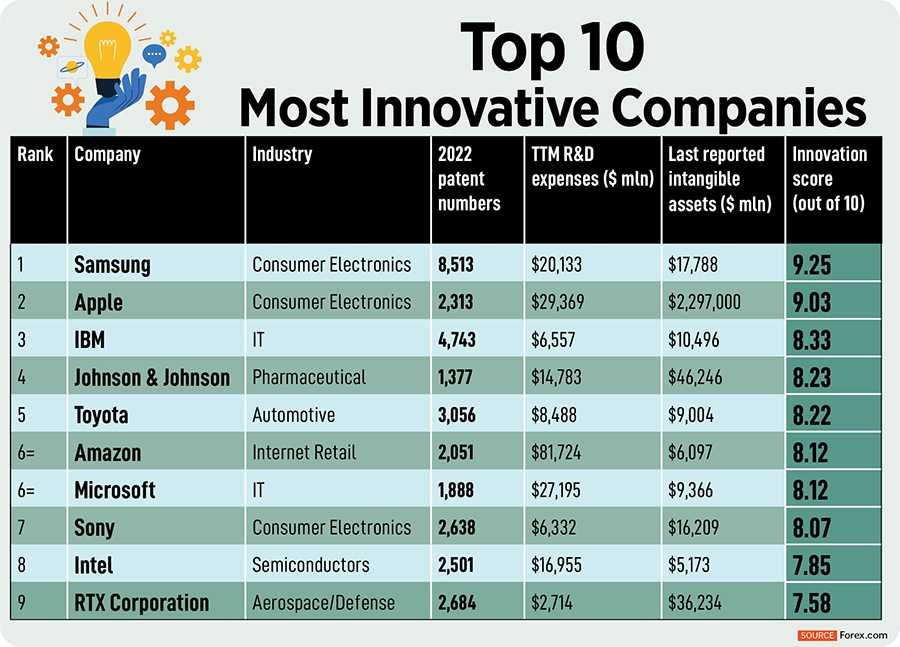Samsung has become the most innovative company in the world after registering the highest number of patents. A Forex.com report had Samsung scoring 9.25 out of 10 in the innovation score, with 8,513 registered patents in 2022. Apple is second on the list, with a score of 9.03 and 2,313 patents.
Though Samsung has registered more patents than Apple, the latter has spent $9 billion more on research and development (R&D). Samsung spent $20 billion on R&D, while Apple’s total R&D expenses were $29 billion. Apple has been constantly investing in R&D, and its expenses grew by 84 percent in the last five years. Samsung’s R&D expenses increased by 20 percent in the same period.
The two electronics giants are fighting toe-to-toe for dominance in the market. As per the Forex.com report, Samsung spent 9.8 percent of its total $205 billion revenue on R&D, whereas Apple’s R&D expenditure amounted to 7.6 percent of its $383 billion revenue.
“This patent portfolio is not just a measure of quantity, but also a marker of Samsung"s potential to disrupt markets and set new industry standards. Meanwhile, Apple"s considerable investment in intangible assets and sustainability initiatives showcases a strategic approach that blends cutting-edge innovation with environmental responsibility," says Matthew Weller, head of global market commentary at Forex.com.
IBM, the leader in patents for 29 years, was third on the list with 4,713 registered patents and spending $6 billion on R&D. Next are pharmaceutical and automaker giants Johnson & Johnson and Toyota. Johnson & Johnson registered 1,377 patents in 2022 and spent $14.7 billion on R&D, while the latter’s figures were 3,056 patents and $8.4 billion as R&D expenses.
Ecommerce giant Amazon is going all out as far as innovation is concerned and has been spending the most on R&D. It’s sixth on the list with 2,051 patents, and its investment in R&D ($81.7 billion or 15.2 percent of its total revenue) is $4 billion more than the combined investment of the top five companies. On average, Amazon spent $23.1 million per patent, the highest among all companies, in the last five years.
![]()
Weller says Amazon"s situation presents an interesting case where high R&D spending hasn"t translated into a proportionate number of patents, especially when compared to a company like Samsung. “This discrepancy can be attributed to Amazon"s focus on service-oriented and software innovations, which often don"t result in patentable entities like hardware-focussed R&D. Amazon"s investments are diverse, spreading across ecommerce, cloud computing, artificial intelligence, and more, indicating a broader strategic focus rather than just patent acquisition," he adds.
Tech and IT giants like Intel, Alphabet, Meta and Qualcomm did not make it to the top 10 despite enormous spending on R&D. Intel spent $16 billion or 31 percent of its total revenue, the highest proportion of revenue. Meta, Alphabet and Qualcomm spent $34 billion, $41 billion and $8 billion, respectively, on R&D.
Consumer electronics companies dominated innovation in not just the top ten list but the whole market. Customers’ expectations for better performance of their devices are fuelling rapid innovation in the sector. Weller says these technologies are evolving at a breakneck pace, offering fertile ground for new developments. Consumer demand plays a crucial role too, as people continually seek newer, more efficient and innovative products.
“The integration of various cutting-edge technologies in consumer electronics like artificial intelligence and virtual reality has opened up unprecedented opportunities for innovation, making this sector a hotbed of creative and technological advancements," says Weller.

